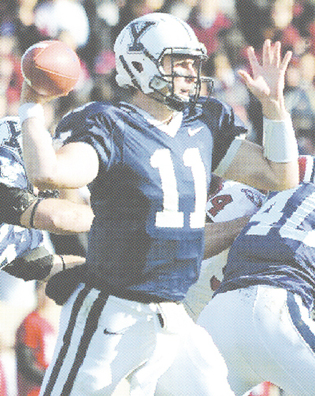 loading
loading
featuresYale, the Rhodes, and the quarterbackAn inspirational story goes awry, raising questions about media ethics, Yale’s Rhodes Scholarship application process, and—once again—how Yale deals with sexual misconduct complaints.
Lauren Rosenthal ’12, a former university news desk editor at the Yale Daily News, is an editorial intern at the Yale Alumni Magazine.  Associated PressYale quarterback Patrick Witt ’12 was hailed as a hero for choosing the Harvard game over a Rhodes Scholarship interview, but the full story was more complicated. View full image
It was a story made for the media. A star quarterback with a sterling academic record was offered an interview for one of the most prestigious scholarships in the world—on the same day he was slated to play in the last big game of his college football career. For two weeks in November, Patrick Witt ’12 publicly wrestled with the decision: give up his chance at the Rhodes Scholarship, or miss the Harvard game to attend interviews in Atlanta. In Witt’s corner was coach Tom Williams, who told the press he was familiar with the struggle: as a Stanford undergraduate, Williams said, he had faced a similar choice, between a Rhodes interview and a professional football tryout. He chose football. Witt discussed his decision on NBC Nightly News, in the Wall Street Journal, and elsewhere. Then, on November 13, he announced his choice in a terse press release issued by the Yale athletics department: “I will be playing in the Yale-Harvard game this Saturday. I have withdrawn my application for the Rhodes Scholarship.” Witt went on to an unremarkable performance against Harvard. Although Yale lost 45–7, Witt was hailed as a hero for choosing his team. But the feel-good story had already begun to unravel. First, just days before The Game, Williams was revealed to have inflated his Rhodes credentials when applying for the Yale coaching job and in interviews. (He was never actually a candidate for the Rhodes, he explained later, although he had considered applying.) Williams resigned on December 21. Later, cracks appeared in the quarterback’s story. In a January 26 article, the New York Times revealed that Witt’s Rhodes candidacy had been suspended after the Rhodes Trust learned that a fellow Yale student had accused him of sexual assault (which Yale defines to include “unwanted sexual contact, unwanted touching, non-consensual sex/rape”). After receiving the tip, the Rhodes Trust took the unusual step of asking Yale administrators to re-endorse Witt’s candidacy if he wished to remain a finalist. (School endorsement is required for all applicants.) Witt announced his decision to play in The Game before Yale responded, the Times said. The Times also reported that Witt had been arrested twice on minor charges of disorderly behavior: once in New Haven and once in Lincoln, Nebraska, where Witt attended the University of Nebraska before transferring in 2009. Witt was widely criticized, as the Times story left many with the impression that he had misrepresented the circumstances surrounding his decision. Witt denies the charge that he orchestrated the hoopla about his decision while knowing his candidacy was in trouble. “The New York Times’s insinuation that I was circulating a media circus is ludicrous,” he told theYale Daily News. “I’m not talented enough to do that. I’m not a media expert.” Most of the interviews Witt gave were before he was told of the need for re-endorsement, and he declined to do any interviews after he announced his decision. The Times received its own share of criticism for publishing a story based on six unnamed sources, and without talking to the complainant. (Witt had declined to talk to the newspaper.) In a flurry of statements following the article, Witt, Yale, and the Rhodes Trust shed a little more light on the events. Via a sports agent he hired to help him respond to the article, Witt said the assault complaint was resolved on November 1, when administrators met with him and told him to keep clear of the accuser, with whom he said he had had an “on-again, off-again relationship.” The agent also denied emphatically that Witt’s Rhodes candidacy was ever “suspended.” But the Trust affirmed that its request to Yale amounted to suspension. Did Witt learn about that re-endorsement request before or after he told Yale he would play in The Game? Both the Rhodes Trust and Yale say it was before. Witt says it was after. He maintains that the assault allegation had nothing to do with his choice to play. Yale, in keeping with its policy of confidentiality about students, will say nothing about Witt’s candidacy or the allegation—or whether the university would have re-endorsed him. The identity of Witt’s accuser and the details of her allegation have not been made public, and under the confidentiality rules, Witt cannot tell his side of the story. Partly for these reasons, the controversy has shined a spotlight on the process for resolving charges of sexual misconduct on campus. It’s a sensitive area for a university that is currently under investigation by the Department of Education over that very issue. For a further discussion of that question, and for a Yale Rhodes Scholar’s thoughts on Yale’s applications process, see the accompanying articles.
The comment period has expired.
|
|